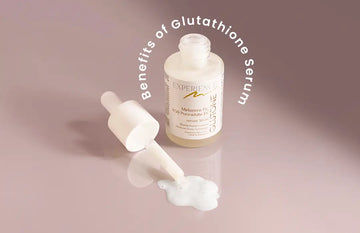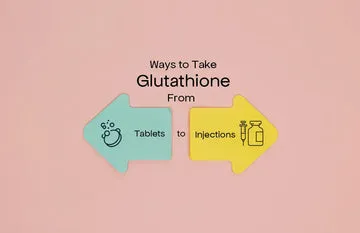How Does Glutathione Reduce Melanin?
Glutathione, a naturally occurring, powerful antioxidant, is known to have a range of benefits. It is predominantly known for its skin-brightening properties. Human and animal skin has pigments called melanin that give it a wide range of shades and tones. So, if you have been thinking about taking Glutathione supplements, you’d have wondered, how does glutathione reduce melanin for naturally glowing skin?
In this blog, we’ll explore the science behind Glutathione melanin reduction. But before we dive into the science, let’s first understand melanin.
What is Melanin?
Melanin, made in the human body, is a complex polymer. The primary precursor to melanin is tyrosine, an amino acid that determines the type of melanin made based on its quantity in the polymer (it is also known as the limiting factor).
The melanin pigment comes in 3 different types:
-
Eumelanin
-
Pheomelanin
-
Neuromelanin
Out of the above three melanins, the eu- and the pheo- melanin play a crucial role in imparting colours to the eyes, skin and hair of a person. Eumelanin gives the skin a black/brown colour to most parts of the body. Pheomelanin gives pink (red or yellow colour) to the skin of the lips and other delicate parts. The human body has a fixed number of melanocytes in the body and they are present in the deepest layers of the skin.
So, What’s the Need to Reduce Melanin?
-
Melanin is not enough to protect your body from sun damage. You still need sunscreen and proper clothing to prevent sunburns and deeper cellular damage.
-
Some research shows that higher melanin levels can reduce sunlight absorption, which in turn may lower vitamin D synthesis in the body.
-
Excess melanin may get unevenly distributed, leading to hyperpigmented spots or patches, especially in sun-exposed areas.
What is Glutathione?
Glutathione is a powerful antioxidant - also known as the master antioxidant - that rejuvenates cells by scavenging free radicals and binding with toxins to detoxify your body. Though it is naturally produced in the body, ageing, poor diet, environmental pollutants, and stress can lower its levels, resulting in increased oxidative stress and hyperpigmentation.
Let’s now understand the different ways Glutathione reduces Melanin.
How Does Glutathione Reduce Melanin?
Glutathione melanin reduction is a scientifically supported process that works by interrupting melanin synthesis and promoting a balanced skin tone.
Let’s look at how glutathione melanin reduction happens and how it helps regulate melanin production:
1. Inhibits Tyrosinase Activity

Here’s a visual representation of how Glutathione inhibits Tyrosinase Activity
Tyrosinase is the enzyme responsible for melanin production. Glutathione binds to the copper icons to reduce tyrosinase activity at the active site, thereby reducing the formation of excess melanin.
2. Promotes Pheomelanin Production
By interfering with the tyrosinase activity, glutathione supplements promote pheomelanin production resulting in a naturally brighter and more even skin tone.
3. Neutralises Free Radicals
As an antioxidant, glutathione combats free radicals that are known to stimulate melanogenesis. By reducing oxidative stress, it minimises unwanted melanin buildup.
4. Modulates Gene Expression in Melanocytes
It suppresses MITF (Microphthalmia-associated transcription factor), a regulator of tyrosinase and other pigmentation-related proteins. This reduces overall pigment output.
5. Supports Detoxification in Skin Cells
Healthy detoxification in melanocytes ensures fewer triggers for irregular pigment distribution.
Why Should You Choose Glutone 1000?
A High-Purity Glutathione Supplement, Clinically Tested
Glutone 1000 contains 600 mg of Setria® L-Glutathione — the world’s most studied and purest form of glutathione — along with 400 mg of N-acetyl cysteine (NAC). Setria is produced via a patented bio-fermentation process, ensuring 99.5% purity and maximum absorption.
-
Clinically Safe and FSSAI Approved
-
3–4 Months Course Duration* for visible results:
-
Regular use of Glutone 1000 Glutathione supplement for 3 to 4* months may lead to visibly brighter and more evenly toned skin.
-
This is because glutathione takes time to accumulate at the cellular level, where it begins neutralising free radicals, reducing oxidative stress, and gradually suppressing melanin synthesis.
-
Clinical studies and anecdotal reports suggest that results typically start to show as early as 8 weeks, with continued improvement in skin texture, clarity, and tone over the full course.
*3-4 month duration is subject to variation based on skin tone and skin type.
-
Backed by Science and trusted by dermatologists
Pairing Glutone 1000 with Vitamin C — such as our Escor Z effervescent tablets — can significantly enhance glutathione stability and performance in the skin.
While melanin is essential for skin protection, glutathione plays a supportive role in regulating pigment production and reducing oxidative stress. Glutathione supplement doesn’t bleach your skin, it balances melanin synthesis at a cellular level to give you a healthier, more radiant complexion. With consistent use of a glutathione supplement like Glutone 1000, many users report visible results in tone and clarity by the process of Glutathione melanin reduction
Ready for a glowing skin from within?
Choose Glutone 1000 — a safe, effective, and clinically backed glutathione supplement.








 Mon to Sat - 10 am to 7 pm
Mon to Sat - 10 am to 7 pm